‘The most difficult thing for us is the water. People try to get up early in the morning to go to the spring to get water, but often the settlers are already there.’
This morning, our team drove slowly along the rocky, narrow road into Ras Ein al ‘Auja in the Jordan Valley in occupied Palestine. We follow the only road access in or out of the small Palestinian Bedouin community – holding our breaths for our driver’s sake in the hope that the car won’t be damaged by loose rock. It’s just 9am but it is already 38 degrees. We can feel the heat greet our bodies with force as we step out of the car.
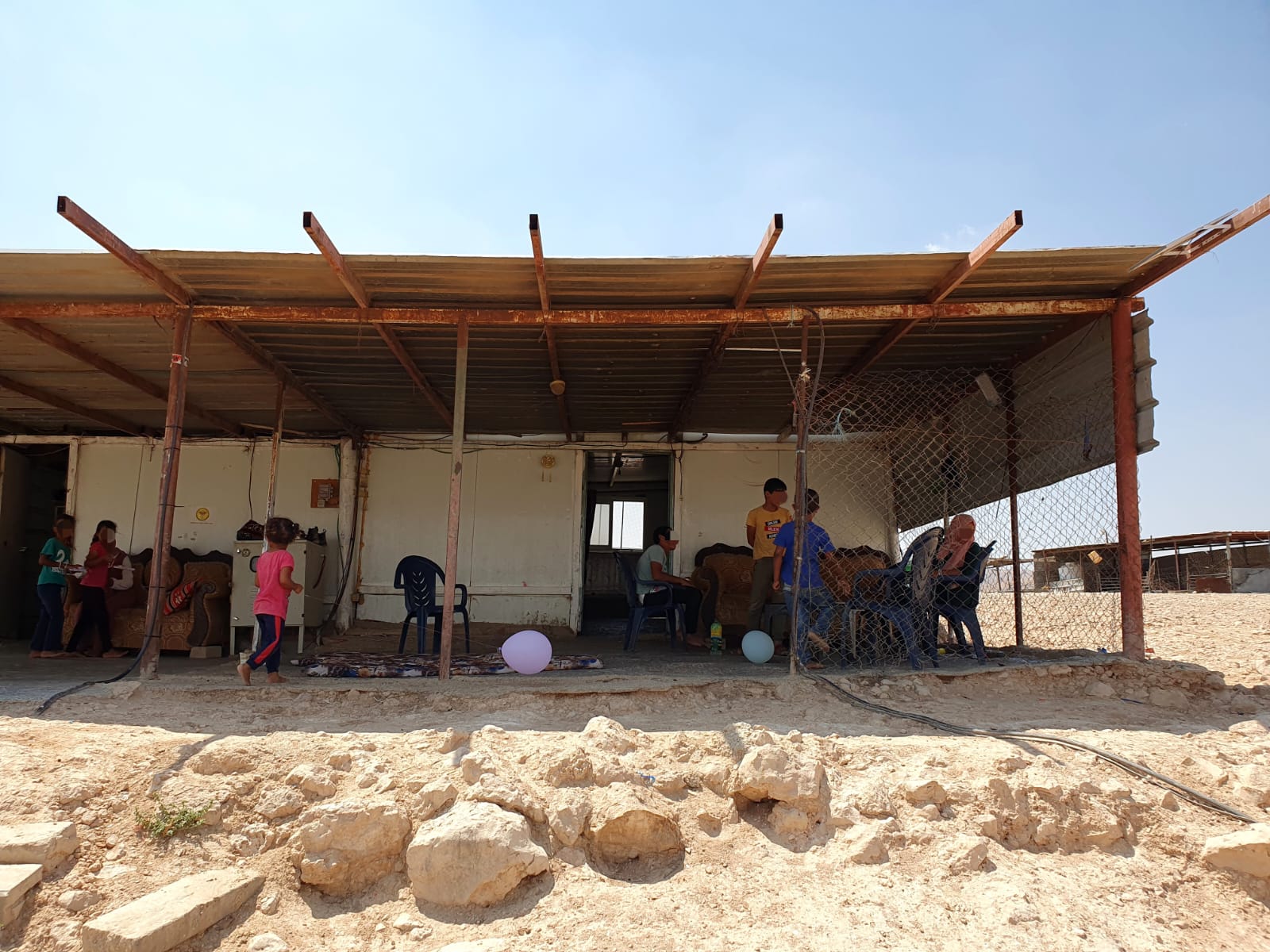
Ras Ein al Auja family
We meet with Layla* and six of her children who all shake our hands respectfully – except the youngest daughter who is enjoying running around her siblings. The other children help to get the chairs organised for us to sit on. Layla greets us with a smile and invites us to sit under the shade. After the initial greetings, Layla doesn’t hold back from talking about the challenges her family and the broader community are facing.
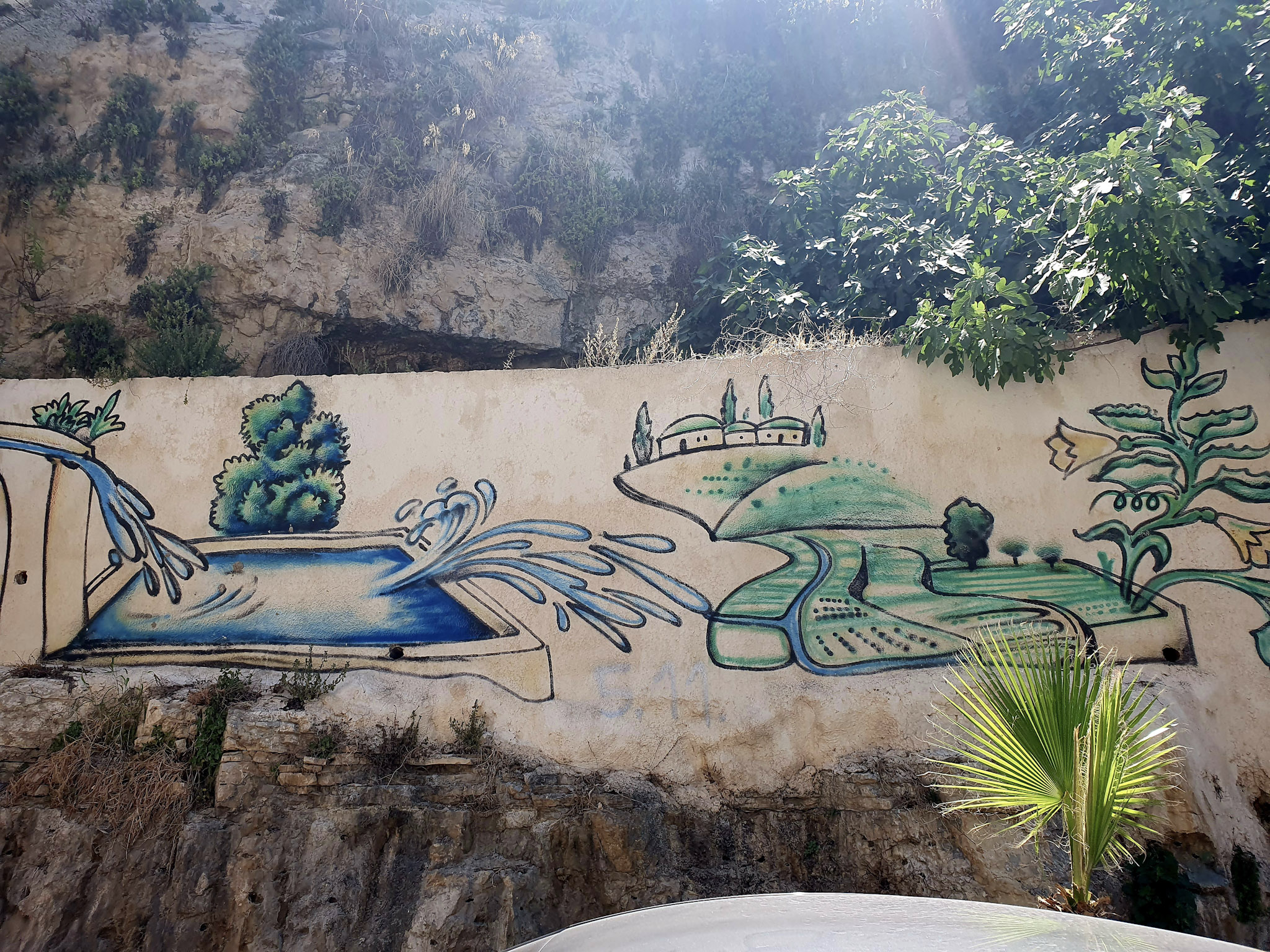
Graffiti of water springs free to access in the Palestinian village of Battir
The spring here, once an abundant water source and a popular gathering place for Palestinian families to picnic, has now become a site of tension and violence. Over the course of one month alone in Ras Ein al ‘Auja, our team has documented more than 20 incidents of settler violence, the majority of which relate to restricting access to water or attacks on Palestinians at the spring. Armed settlers from a nearby settler outpost having been entering the community and restricting access in and out – by blocking the road with vehicles and rocks – as well as harassing the community at their homes and on the land nearby, preventing them from shepherding and blocking access to the spring. This community living beside the spring is becoming more isolated with each day that passes.
‘They have made our place like a prison, coming to us from every direction.’
Layla tells us that she is finding it difficult to leave the community to get food for her children or to access healthcare. One of her sons has a disability that means he needs extra care. She expressed deep concern about the impact on his health and wellbeing because of the restrictions on the family’s movement and on people visiting the community too. Salespeople used to come to the village to sell cleaning products and day–to–day goods as there is no local shop, but now the salespeople are too scared to enter the community due to the risk of settler attacks. She told us that a mobile health clinic that visits the community, recently had to turn around and leave because their vehicle was attacked by settlers.
Layla told us about how scared her children are, saying that they now sleep with their shoes on so that they can run away if the settlers come.
‘In the beginning we were scared at night, but now we don’t feel safe at all. We are scared all the time.’
Even with the wide range of challenges faced by the Bedouin community in Ras Ein al ‘Auja at present, the families are steadfast in their will to stay on their land, but the increasing restrictions on water pose a very serious threat to their existence.
This community currently have a 24/7 presence of Israeli peace activists to try and reduce the impacts of the harassment and violence that they face.
‘We accept this life, but we need clean water.’
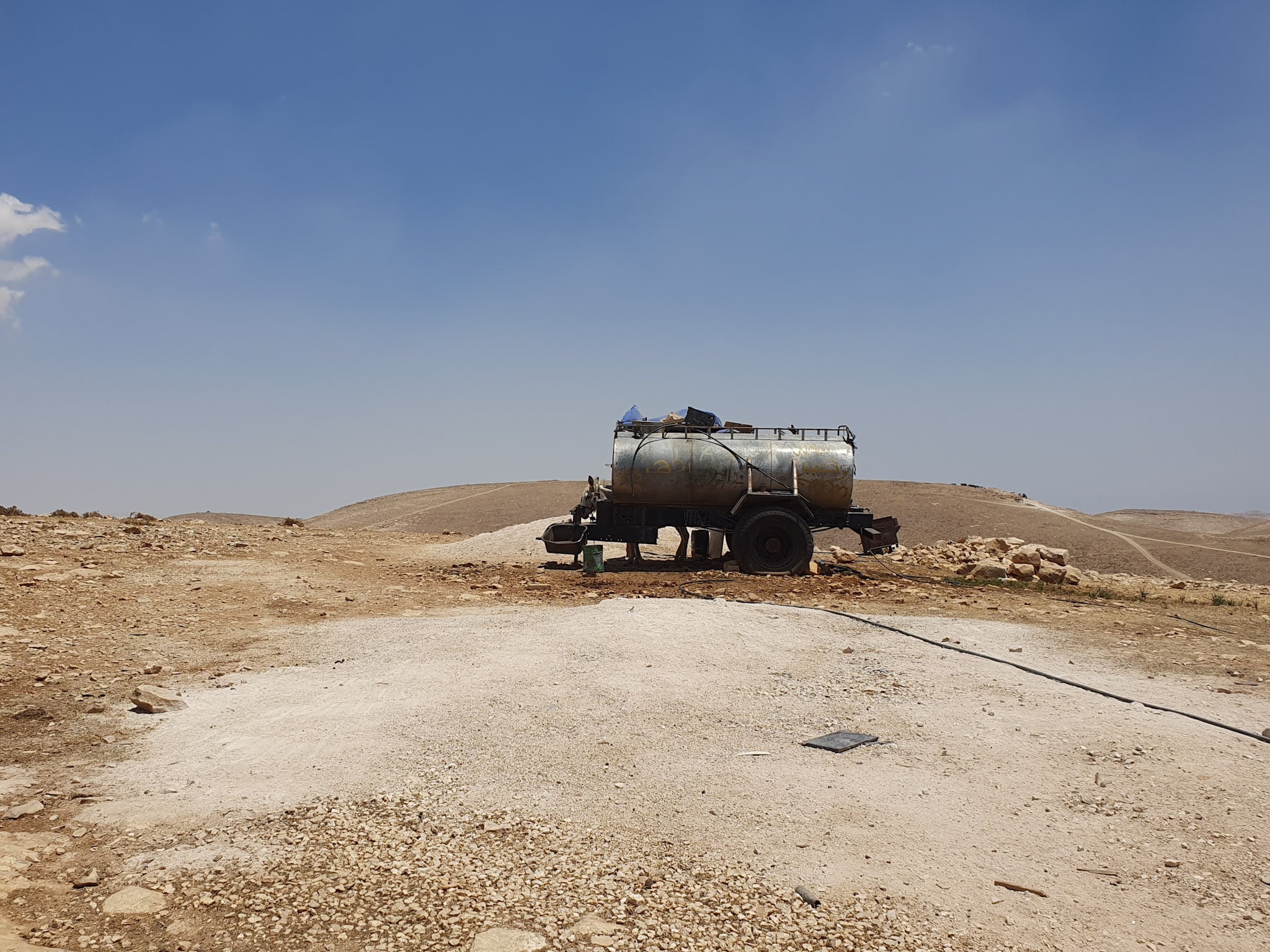
Water tank, Al-Minya, Bethlehem
Previously, the community used to get drinking water from the Israeli state-owned water company Mekorot, but Layla told us that the Israeli authorities closed the pipe just over one year ago, before the violence in Gaza. While Mekorot sells some water to Palestinian communities, the amount is determined by the Israeli authorities. Now, Layla’s family must drive a tractor pulling a water tank around 6km to the nearby town of Al ‘Auja roughly every 20 days to collect 3m³ of drinking water from pipes there. They must pay for the gas to cover the tractor journey each time, on top of the risk of settler violence e.g. stone-throwing while driving on the main road. According to Amnesty International, in some of the most marginalised communities, ‘water expenses can, at times, make up half of a family’s monthly income.’
Layla says that the family try to conserve water as much as they can.
‘We wish we could connect up a water network to the community, or fix the road in, basic things.‘
Additionally, the people in Ras Ein al ‘Auja, as well as many of the surrounding communities, use the fresh water from their local spring for washing and for farming. In the past five months Palestinian shepherds and farmers have been prevented, often violently, from filling up water tanks at the spring, and from bringing their sheep to drink water there by settlers, settlement security and on occasion, Israeli soldiers. Rocks have also placed in the spring by settlers to divert water away from the Palestinian community towards the nearest outpost. Water pipes have been cut by settlers, and wells in the surrounding communities have been closed by the military. In an incident this summer, settlers painted the Israeli flag along the water canal from the spring.
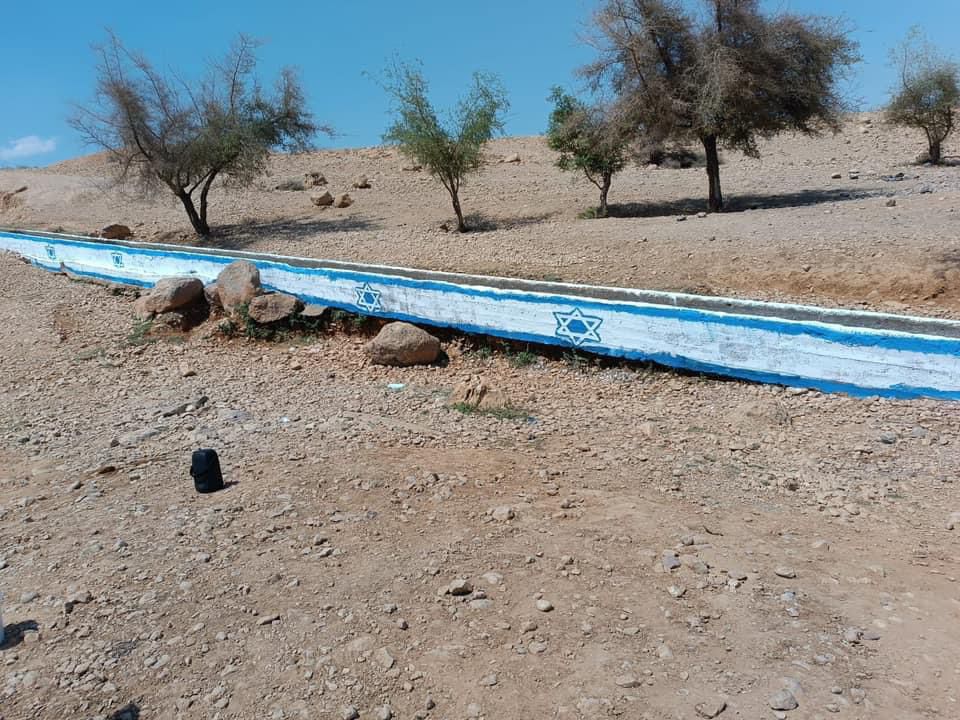
‘My family have been here more than 40 years, it wouldn’t matter if we have been here 100 years, the settlers don’t care they will just try to take over.‘
More and more Palestinian land in the Jordan Valley has been taken over by both settlers expanding settlements and building illegal outposts, and by the Israeli authorities claiming land as closed military zones. This means that Palestinians are continually squeezed into smaller and smaller areas of land. Just recently, the Israeli government declared a further 12,700 dunams of land in the Jordan Valley as ‘state lands’.
According to Peace Now, this is one of the main methods that the Israeli government uses ‘to assert control over land in occupied Palestine’. Freedom of movement, access to services such as healthcare and education, and access to livelihood such as shepherding or farming are all squeezed too. The same applies to access to water.
After the 1967 war when Israel first occupied the West Bank, Israeli human rights organisation, B’Tselem state that ‘sweeping bans and restrictions on the Palestinian water sector’ were immediately introduced. Palestinians are required to seek permission to drill new wells or deepen existing ones, but such permits are rarely, if ever, granted. Additionally Israeli drillings close to Palestinian communities have dried up local water sources like the springs in Bardalah in the north of the Jordan Valley.
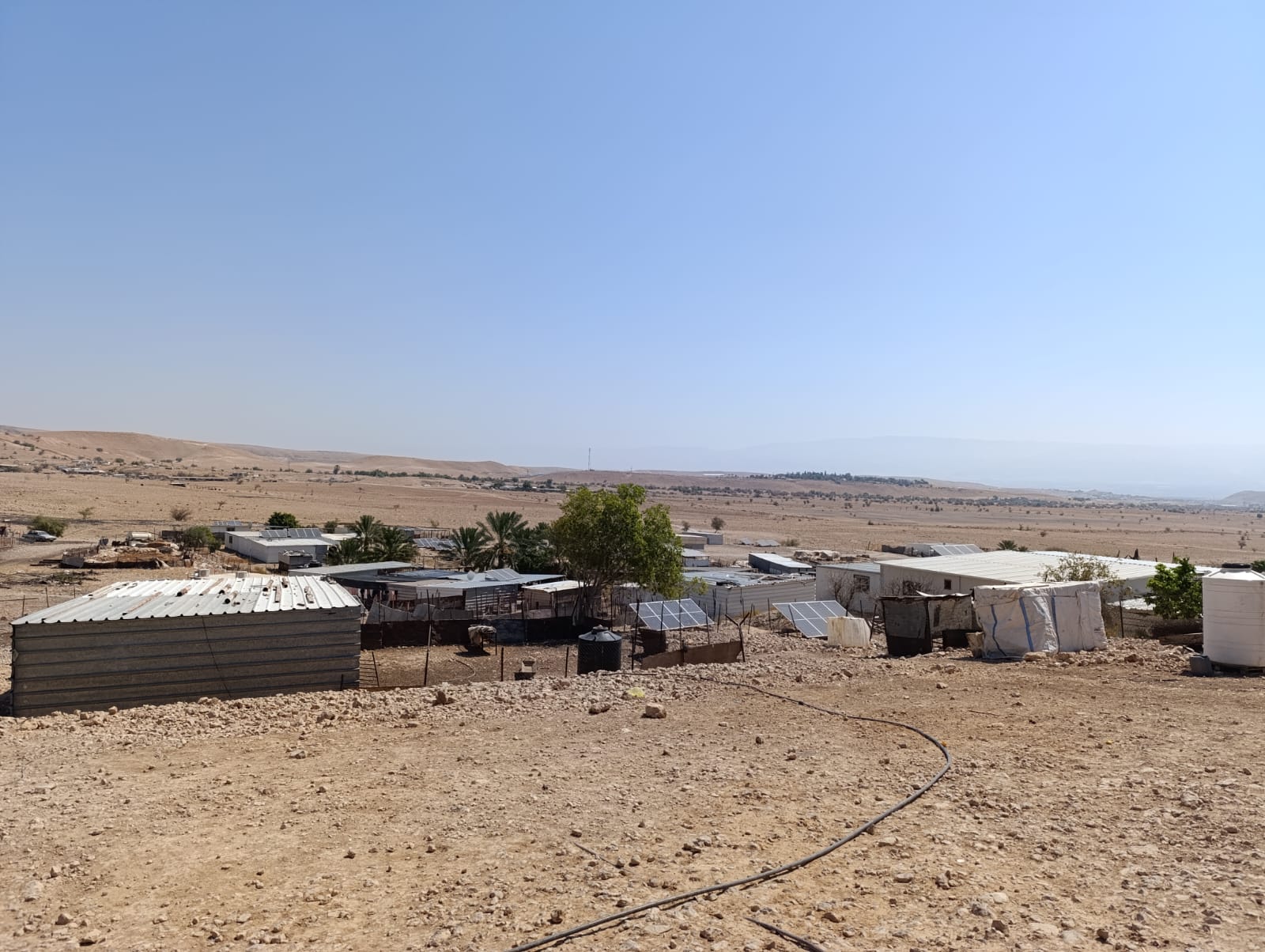
Ras Ein al ‘Auja
As Israel has developed its water infrastructure for its own citizens in Israel and in settlements in the West Bank that are illegal under international law, the inequity of access to water between Israeli settlers and Palestinians has continued to increase. By now, Israel has taken control over much of the water in the Jordan Valley area, siphoning the majority off to settlements. According to B’Tselem;
‘though the number of Palestinians living in the area is more than eight times the number of settlers, about 70% of the water output is given over to Israeli settlements… Residents of settlements in the Jordan Valley enjoy double or even triple the water allocation compared to average consumption by all other Israeli citizens.’
Israeli settlers living in settlements close to Palestinian communities – in some cases just a few hundred meters away – benefit from unrestricted water access using well-irrigated farmlands and swimming pools.
Amnesty International’s 2017 report, The Occupation of Water further explains that Palestinians’ access to water is severely restricted by the Israeli authorities by denying or limiting their access to large parts of the West Bank. Many parts of the West Bank have been cut off by checkpoints, roadblocks or fences and entire areas are declared ‘closed military areas’, which Palestinians may not enter.
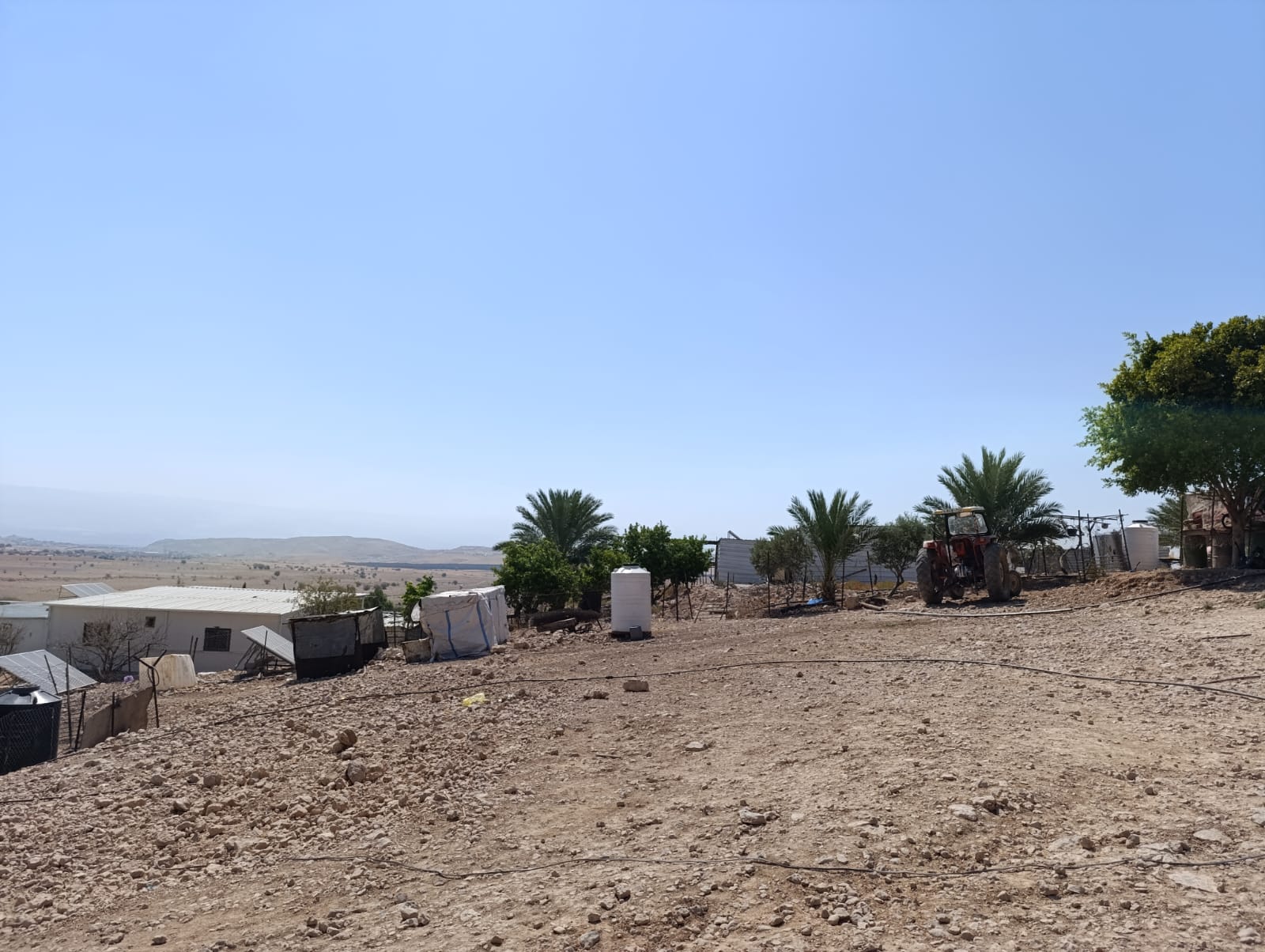
Ras Ein al ‘Auja
B’Tselem reported figures in May 2023 that indicated a severe water crisis among Palestinians in the West Bank which they described as;
‘an intentional outcome of Israel’s deliberately discriminatory policy, which views water as another means for controlling the Palestinian population in the West Bank.’
On top of the restrictions on access to water from the Israeli authorities directly, Palestinians are also facing attacks by settlers at natural water sources like local springs. Layla told us that the community can now only go to the spring to try and retrieve water with the help of Israeli peace activists who are there to try to reduce the impacts of settler violence in the area.
‘People used to be able to get water from the spring several times a week, now they can only go once a week at most. We have to wait for peace activists to get any water from the spring and even then, it is not always possible.‘
Layla’s community in Ras Ein al ‘Auja, and Palestinians across the West Bank, have seen a stark rise in settler violence in the West Bank since the violence in Gaza began October 7th 2023. Even before this, 2023 had already seen the highest rate of settler violence since UN records began.
The restrictions on water access that Layla’s family – and many like them – face, put extra pressure on communities to leave due to inability to survive financially or physically. Livelihoods, particularly for those who have livestock or farmland, are deeply impacted.
‘They [the settlers] want us to leave from here, that is what they want.’
In another report, B’Tselem asserted that through collaboration between the military, police and settlers, Israel blocked regular water supply alongside reducing grazing areas available to Palestinians in a process of ramping up efforts to drive Palestinians out of the Jordan Valley.
Safe drinking water is essential to life. These active restrictions on water prevent many Palestinians in the West Bank from meeting their most basic needs for an adequate standard of living and make it increasingly difficult for Layla and her children to sustain a life in Ras Ein al ‘Auja. Layla told us that this is their home and that they have nowhere else to go.
‘Whoever lives closest to the spring is suffering the most... since the settlers arrived here, our life has become very difficult.’
In July 2024, the International Court of Justice (ICJ) advisory opinion stated that the Israeli military occupation of Palestine, including its control over natural resources, is illegal and ordered Israel to evacuate all settlers and make reparation for the damage caused. The ruling has created a vital opportunity for the international community to take meaningful action to honour the findings of the court. Take action below.
Take action!
-
Sign and share our urgent action on the ICJ’s Palestine ruling! In the UK? Sign here. In Ireland? Sign here.
-
Israel’s expanding military campaign is having catastrophic consequences for people in Palestine and Lebanon. Donate to the Disaster Emergency Committee (DEC) humanitarian appeal here. Can’t donate? Can you share with your friends and family?
-
Learn more about water inequality in the West Bank here.
What does international law say?

